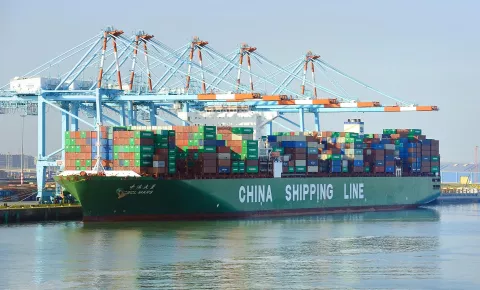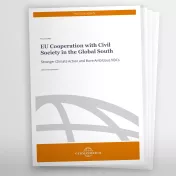
It sounds bureaucratic, but it is one of the hottest issues currently discussed when it comes to the green transition: The EU’s Carbon Border Adjustment Mechanism (CBAM). Numerous stakeholders and politicians worldwide accuse the EU of apparently introducing a protectionist system for modernizing the EU’s industry at the expense of less well-off countries. Consequently, the EU could soon face trade war threats.
CBAM is meant to prevent EU industries from shifting production to non-EU countries with less stringent climate policies, which would lead to carbon leakage and hence higher global greenhouse gas emissions. This instrument is vital for achieving a zero-emissions industry in the EU in the 2040s, given that good alternatives for carbon leakage prevention are not readily available. Additionally, CBAM could become an accelerator for global climate action.
This Germanwatch study provides a deep-dive into CBAM perceptions in China, Russia and Ukraine, countries that could be heavily affected by a CBAM and/or could consider retaliation measures against the EU. It reveals that the EU’s CBAM plans have already had a positive impulse on climate debates in EU trading partners.
The study finds that the EU should approach the carbon border adjustment in a cooperative, rather than confrontational manner. The EU should urgently consult affected countries much more thoroughly with respect to the CBAM design and use CBAM revenues for the green transition of, i.a., low- and middle-income trading partner countries. Additionally to the CBAM, the EU and member states like France and Germany should now offer to effected trade partner countries climate partnerships to jointly tackling the decarbonization challenge. Besides, the EU should clearly communicate that free allocation of EU ETS allowances will be phased out as soon as CBAM kicks in.
Quotes
Anne Gläser (co-author of the study):
“The recently leaked CBAM draft regulation does little to appease trading partners. On the contrary, the EU is partly reinforcing the widespread perception of CBAM being a confrontational, protectionist measure. This is because so far the EU seems to earmark the CBAM revenues for the general EU budget and has failed to communicate a timeframe for the phase-out of free allocation of EU ETS allowances. If implemented badly, CBAM could harm international cooperation on climate change. However, we see a good chance that CBAM could become a cornerstone for enhanced global cooperation on climate change. The EU’s CBAM plans have already had a positive impulse on climate debates in EU trading partners.
Our study reveals that one of the most important game changers for the international acceptance of an EU CBAM is revenue recycling. The EU should use CBAM revenues to support the green transition of less affluent countries, including those trading partners affected by the CBAM.”
Oldag Caspar (co-author of the study):
“The EU should make the larger part of revenues available to CBAM-affected countries as support for their industry transition, for example through an international investment fund. The remaining funds should be used to top up international climate finance. Besides, the EU should clearly communicate the phase-out of free allocation. As another urgent tool, the EU should accompany CBAM by offering extensive climate ambition cooperation to trade partners, for example for building up carbon pricing systems or for research and development.
With CBAM, the EU has shown the stick to trading partners. For making CBAM a success for climate policy action in the EU and internationally, it is now high time to develop the carrots. The EU should transform CBAM from a confrontational measure to a tool of cooperation. Through a smart CBAM with accompanying tools, the EU can set new standards of global climate cooperation.”



